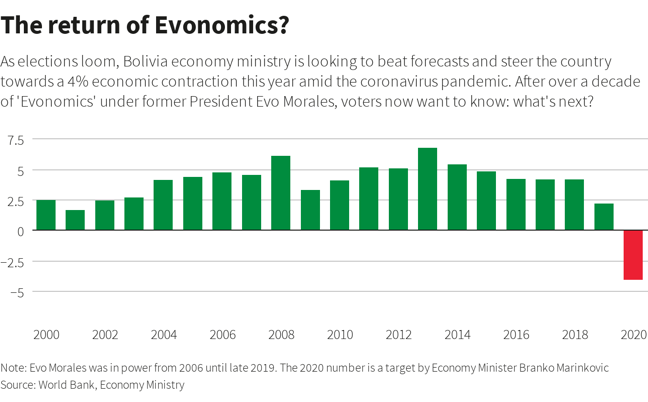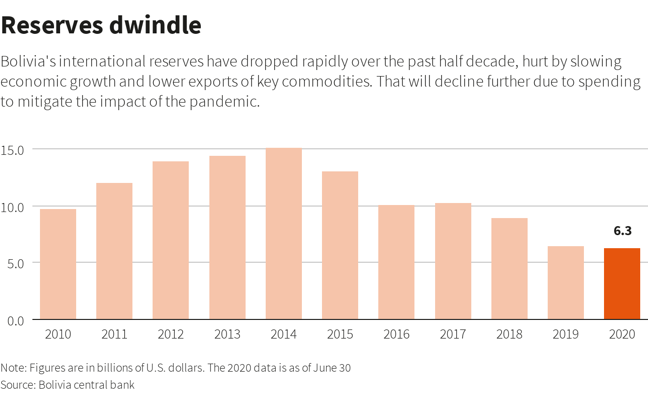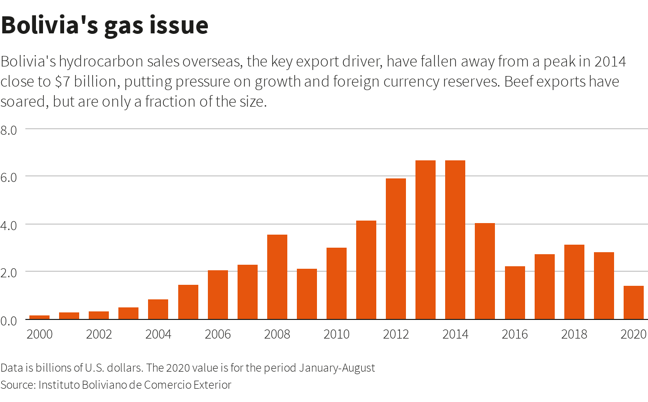
(above) Women are seen at a street market I La Paz, Bolivia, October 8, 2020. REUTERS/David Mercado.
As Bolivia election nears, could 'Evonomics' make a comeback?
October 8, 2020 - Original article: Reuters
Daniel Ramos
LA PAZ (Reuters) - Bolivian voters, hit hard by political turmoil and the coronavirus pandemic, are looking for some economic certainty ahead of elections on Oct. 18, which opinion polls suggest could boost the country’s socialists and see a return of ‘Evonomics’.
The Andean country was one of Latin America’s steadiest economic growth stories during the near 14-year rule of leftist leader Evo Morales, whose brand of socialist capitalism drew plaudits - though cracks appeared in later years.
Morales resigned in 2019 after a fraught election that was dogged by allegations of fraud, sparking off a period of political tumult and violent protest. The vote this month is a delayed re-run of that ballot.
Morales’ socialist MAS party leads in opinion polls even though the man himself is in exile in Argentina. The party has been helped by memories of past economic stability, while the pandemic has left many in poverty and out of work.
“I will vote for MAS because it identifies with the people and it gave us work all these years. Not like now, when there is hardly anything to eat,” said Juan Muriel, 43, a bricklayer from the highland city of El Alto.
Bolivia’s economy, dominated by farming and gas, is forecast by the World Bank to contract around 6% this year, while foreign reserves have fallen dangerously as exports of gas and soy have declined.
Morales’ so-called ‘Evonomics’ - a mixture of nationalization, public works and some industry-friendly policies for sectors like farming - helped drive over a decade of growth, though critics say his government rode the regional commodities boom in the 2000s which pumped up gas exports, and growth started to fade long before he left office.
Growth of 2.2% last year was already the weakest since 2001.

The interim government’s newly appointed Economy Minister Branko Marinkovic told Reuters the economic damage caused by the pandemic was around $5 billion, though he was hoping the economic contraction could be held at 4% this year.
“I hope to narrow the drop,” he said, adding the economy could rebound 4% in a “very tough” 2021.
The interim government of President Jeanine Anez, who took over in a power vacuum after Morales’ resignation last year, was looking to seal loans from international lenders to help the country recover, he said.
“I can’t leave a time bomb for the next government and not be responsible for leaving some kind of bridging loan for the years ahead, which are going to be tough,” he said.
The pandemic saw Bolivia’s economy contract 7.9% in the first seven months of the year, while unemployment has shot up to 11.8%, official data show. The fiscal deficit has ballooned.

‘BOLIVIA IS IN DANGER’
Anez withdrew from the presidential race last month, leaving centrist former President Carlos Mesa as the key rival to socialist front-runner Luis Arce, a close ally of Morales and his long-time economy minister.
“Today more than ever Bolivia is in danger, Bolivia is at risk and there is no response from the right-wing parties that will solve the problem. We have the solution,” Arce said last month.
The latest opinion polls show Arce leading in the first round ahead of Mesa, though not by enough to avoid a second round run-off, which Mesa could potentially win.
Mesa, whose Citizen Community (CC) party came second in last year’s voided election, said that his priority would be job creation.
“In order to recover the jobs that were lost as a result of the pandemic and generate new ones, we need to inject economic resources into companies and families,” he said.
Ruddy Villanueva, 48, the owner of a clothing store in La Paz, said he was leaning towards voting for Mesa, citing accusations of MAS corruption and saying they did not do enough to invest in industry or jobs while in power.
Daniela, a 23-year-old student at the Catholic University in La Paz who declined to give her second name, said she was still undecided.
“No candidate yet convinces me and I don’t see that there are any real proposals. The country’s situation is urgent and without a good president things can only get worse.”

Reporting by Daniel Ramos; Editing by Adam Jourdan and Rosalba O’Brien